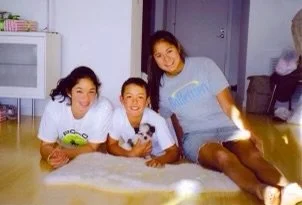Death is Inevitable, but Nobody Wants to Talk about It

I recently said goodbye to Ace, my beloved 16-year-old shih tzu/bichon mix. Although Ace was blind, deaf, and arthritic, he had no idea he was anything other than a perfectly healthy dog in a perfectly healthy dog body. Despite his ailments, he somehow found the energy to play with our other dogs, swim with abandon, eat ravenously, and just generally enjoy life.
That is, until the last few months, when his health problems became more serious, and it was obvious that he had lost his joie de vivre. As we snuggled, I could see it in his eyes: he was ready to go. All the medical interventions in the world weren’t going to change that fact.
On the one hand, I was grateful to be able to help my friend take this last step. He had helped me through so many hard times — not the least of which was being my best friend during a surprise divorce several years ago — and now it was time for me to return the favor. I could, of course, had let Ace’s body decline on its own schedule. But anybody who has witnessed a loved one in the final stages of life knows that path can be long and painful.
As humans, we are given the almost unfathomable power to make life-or-death decisions for our beloved pets. It’s an exceedingly difficult decision, but I’m grateful we get to make it. We should all get to make such a peaceful exit, surrounded by the people we love most in the whole world, being reminded that we were a good friend, and that it’s OK to say goodbye.
For a whole host of legal and ethical reasons, we don’t get to make that same decision for the humans we love. And sometimes I wish we could. Not every death is peaceful or comfortable, and it’s often not on the dying person’s terms.
Sadly, I’ve already experienced the death of both of my parents, as well as a sibling. So, I’m no stranger to death. Still, it’s not great cocktail party chit chat, and nobody wants to talk about the slow-moving train that’s headed for us all — or what our preferences are when it’s just around the bend.
If you haven’t already given some thought to your final wishes, I recommend you give some thought to how you want your final months, days, and hours to look. And put some plans in place to help ensure that they resemble what you have in mind. (I suggest reading Atul Gawande’s book Being Mortal for starters.)
And if you have a friend or family member who is nearing death, reach out to them and, if they’re lucky enough to have one, their caregivers, and make time for a visit. First off, their caregivers might need a break. But more importantly, don’t save your kind words and friendship for the memorial service. They’re more meaningful — and even more welcome — while the person is still living.
I have a friend whose beloved mother-in-law is suffering from a fatal, degenerative disease that has robbed her of her ability to eat or speak. While the process has been heartbreaking for the family, it has also mended (at least temporarily) some deep fissures in the family.
“I’m sure my mother-in-law isn’t happy about what’s happening to her body, but I can tell that seeing her children together again has been, I don’t want to say ‘worth it,’ but I know it’s made her happy,” my friend said. “So even with all this sadness, we’ve found something to celebrate. That’s probably why, even though she can’t eat or speak, and her body is getting weaker every day, she’s remained in remarkably good spirits.”
Death is no party, but it’s coming for us all. So, we might as well get comfortable with it. And, just like my friend’s family, find the positive in life’s least favorite milestone.





